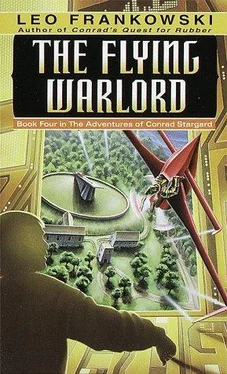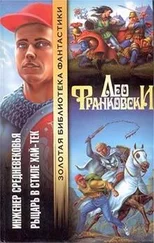Лео Франковски - The Flying Warlord
Здесь есть возможность читать онлайн «Лео Франковски - The Flying Warlord» весь текст электронной книги совершенно бесплатно (целиком полную версию без сокращений). В некоторых случаях можно слушать аудио, скачать через торрент в формате fb2 и присутствует краткое содержание. Жанр: Альтернативная история, на русском языке. Описание произведения, (предисловие) а так же отзывы посетителей доступны на портале библиотеки ЛибКат.
- Название:The Flying Warlord
- Автор:
- Жанр:
- Год:неизвестен
- ISBN:нет данных
- Рейтинг книги:4 / 5. Голосов: 1
-
Избранное:Добавить в избранное
- Отзывы:
-
Ваша оценка:
- 80
- 1
- 2
- 3
- 4
- 5
The Flying Warlord: краткое содержание, описание и аннотация
Предлагаем к чтению аннотацию, описание, краткое содержание или предисловие (зависит от того, что написал сам автор книги «The Flying Warlord»). Если вы не нашли необходимую информацию о книге — напишите в комментариях, мы постараемся отыскать её.
The Flying Warlord — читать онлайн бесплатно полную книгу (весь текст) целиком
Ниже представлен текст книги, разбитый по страницам. Система сохранения места последней прочитанной страницы, позволяет с удобством читать онлайн бесплатно книгу «The Flying Warlord», без необходимости каждый раз заново искать на чём Вы остановились. Поставьте закладку, и сможете в любой момент перейти на страницу, на которой закончили чтение.
Интервал:
Закладка:
Now that took me back a peg or five. I'd heard a lot of stories about that school and wasn't none of them good. It was supposed to be a secret, but everybody knew that three-quarters of the men who started didn't live through it and I told Baron Conrad so.
He said that I'd been listening to a lot of old wives' tales. That while only a quarter of the first class graduated, only one in six had actually died. Most of the rest had been washed out for injuries, or physical or mental problems, and anyway the next class would not have it so hard. They were projecting a fifty percent graduation rate. On top of that, everybody who worked for Baron Conrad would soon have to go through the school, so I might as well get it over with, before I got any older. Younger men had a better survival rate.
I said I didn't like them words "survival rate," but Baron Conrad said he only meant the ratio of men graduating, and nobody wants to live forever, anyhow.
I said it was my Christian duty to try, but Baron Conrad, he told me that it was still a secret, but that all of that first class was going to be knighted, and the next one was, too. He told me to think about all them pretty young girls I saw in the shower room every day and to think about the old widow I was living with. Yeah, I guess he knew about it.
So I thought about them eager young smiles and the Widow Bromski's scowling face, and about them bouncing young tits and her sagging dugs and that's what done me in.
Chapter Two
FROM THE DIARY OF CONRAD STARGARD
The weather was so beautiful that Krystyana and Sir Piotr had elected to have their wedding ceremony, complete with church service and reception, held outside. Since Sir Piotr was the local boy who had made good, the priest and everyone else went along with it.
And of course, since everything had to be done as ceremoniously as possible, the mass went on for over an hour and I had some time to get some thinking done. I was working on my next four-year plan.
Yes, I know that socialists are supposed to write five year plans, but in less than four years the Mongols were going to invade, and there didn't seem to be any sane reason to plan much beyond that. If we could lick the Mongols, we'd have a whole lifetime to plan things. If not, well what was the point? We'd all be dead.
For the last five years, I had been working mostly at getting our industrial base going. We now had a productive cloth factory and a sugar refinery here at Okoitz, and a coppermining, smelting, and machining installation at Copper City, that Duke Henryk owned. More than a dozen of Count Lambert's other barons and knights had various light industries going at their manors, mostly to keep their peasants busy during the winters. Some of them were my vendors, making boots and uniforms for my future army.
At the Franciscan monastery in Cracow, we had a papermaking plant, a printshop, and a book bindery. And besides books, they were also producing a monthly magazine.
I had three new towns of my own running. There was Three Walls , where we were making iron, steel, coke, cement, bricks, and other ceramics, and machinery, plus several hundred different consumer products. It also had a major carpentry shop, set up for mass production, and valley filled with Moslem refugees that functioned as an R&D center and a gunpowder works. There was Coaltown, where we were making coke, bricks, glass, and chemicals. And there was Silver City, in the Malapolska Hills, where we mined and refined lead and zinc.
Silver City got its name when my sales manager, Boris Novacek, refused to let me call zinc by its rightful name. He said that a zinc was a musical instrument, and that it was stupid to use the same word on a metal. He wanted to call it "silver" and pass it off as the real thing, but I wouldn't let him do it. We compromised on "Polish Silver," and the name stuck.
In addition to the factories and mines, a major agricultural revolution was taking place, mostly because of the seeds I'd brought back with me, but also because of the farm machinery I'd introduced.
Understand that none of these installations was really up to twentieth-century standards. At best, some of it was up to nineteenth-century standards. Everything was primitive and on a small scale. Most of the work was still being done by hand, and the most useful and cost effective piece of farm machinery I'd introduced was the wheelbarrow. Well, the new steel plows worked well, and the McCormick-style reapers sold well even if they were too expensive. A whole village had to club up to buy one.
Nonetheless, worker productivity was four times what it had been when I'd arrived, and things were constantly getting better. The infant mortality rate was way down, too, because of the sanitation measures I'd introduced. Of course, the birth rate hadn't changed to any noticeable degree, so the place was crawling with rug rats, but what the heck. There was plenty of room for them. There was an underpopulated world out there.
Eagle Nest was nominally an aircraft development center, but I completely doubted if a bunch of twelve-year-old boys could really develop practical aviation. I'd helped build it to keep my liege lord happy and because in the long run, it was actually an engineering school, which we needed.
Lastly, I had the new Warrior's School ready to go, and my corps of instructors trained. My army was to have three branches.
The first branch would be made up of my existing factory workers. They would all have to go through an abbreviated basic-training period of six months and then train one day a week after that. The problem was that I would have to send the managers through first, since we couldn't have a situation where the subordinates were knighted and the managers were commoners. Discipline would vanish! There wasn't time to send the managers out in small bunches, so there was nothing for it but to send them all at once, which involved running the factories with untrained, temporary managers. It was scary, but I didn't see any way around it. Everybody in the top two layers was told to pick a man from below and teach him how to do his job in ten weeks. Only thirty-five men were leaving, but they were my best thirty-five men.
There were screams and moans from all quarters, but I got my way.
Furthermore, all new hires, women as well as men, had to go through the six-month training period before they could start work. I required the women to be trained because when we went off to war, I planned to take every able-bodied man with me. The women would have to "man" the wall guns and other defenses without us. And this meant setting up a training program for the wives of my managers as well.
Then there were the river defenses. If the weather was right, and the rivers weren't frozen, we just might be able to stop the Mongols at the Vistula, or even at the Bug. We already had good steam engines and a carpentry shop set up for mass production. Steamboats should be a fairly straightforward proposition. The troops manning them would be hired from among existing riverboat men and then put through the full-year basic-training program. Then, after that, they'd have to learn about fighting from a steamboat on the job.
The regular army would be a full-time group based on the training instructors I already had. Besides training everybody else, they had to multiply their own numbers by at least six each year for the next three years, and then twice more in the last year to get us an army big enough to do the job. And those were absolute minimums. Anything less than fifty thousand men would just get us all killed. The production quotas for the factories were set up for a hundred fifty thousand.
From an economic standpoint, land transport was even more important than river transport. All of the roads were so bad that it was almost impossible to get a cart over them. Almost all goods were transported by caravan mule, and the best of them could only carry a quarter ton. They could only do thirty miles a day and had to be loaded and unloaded twice a day at that. But on level ground, on a steel track and steel wheels with good bearings, a mule should be able to tow two dozen times what it could carry on its back.
Читать дальшеИнтервал:
Закладка:
Похожие книги на «The Flying Warlord»
Представляем Вашему вниманию похожие книги на «The Flying Warlord» списком для выбора. Мы отобрали схожую по названию и смыслу литературу в надежде предоставить читателям больше вариантов отыскать новые, интересные, ещё непрочитанные произведения.
Обсуждение, отзывы о книге «The Flying Warlord» и просто собственные мнения читателей. Оставьте ваши комментарии, напишите, что Вы думаете о произведении, его смысле или главных героях. Укажите что конкретно понравилось, а что нет, и почему Вы так считаете.




![Brian Jacques - [Flying Dutchman 01] - Castaways of the Flying Dutchman](/books/128851/brian-jacques-flying-dutchman-01-thumb.webp)






